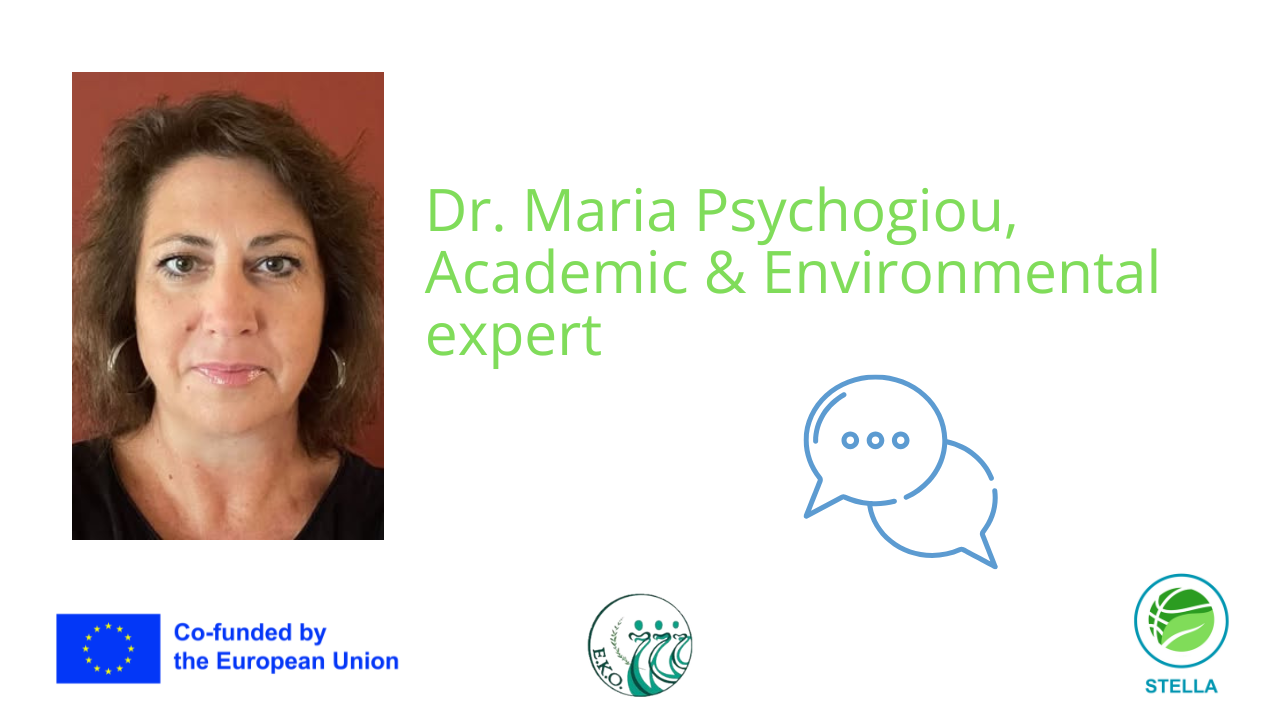

As part of the STELLA project, which seeks to explore the intersection of sustainability and sport, EKO is proud to present an inspiring conversation with Dr. Maria Psychogiou. An educator and researcher with a Ph.D. in Geology teaching, Dr. Psychogiou is a member of the pedagogical team at the Environmental Education Center in Argyroupoli, Athens. Her work focuses on informal, outdoor education in Earth sciences, and she has published articles on experiential learning and innovative methods for teaching climate change. An advocate for experiential learning in nature, Dr. Psychogiou combines her passion for the environment with activities such as hiking, winter swimming, and tai chi, aiming to reconnect youth with the natural world through education and sport.
Introduction and Experience within Youthwork, Sport, and Environment
I am an educator with many years of experience and I am currently a member of the pedagogical team of the Environmental Education Center in Argyroupoli, Athens. I hold a Ph.D. in Geology teaching and my main research focuses on informal, outdoor education on Earth sciences. I have published articles on experiential learning, the incorporation of field trips in the school curriculum, and innovative ways to teach climate change. I have taken part in several Erasmus+ youth exchanges as a leader as well as in training courses, the last one being “Mindul Nature”. I am a nature lover and a winter swimmer, I practice mindfulness in nature, go hiking, and spend as much time as I can outdoors. I recently took up tai chi and often practice it in the open, taking advantage of both working out and enjoying the physical environment. I have a deep insight into environmental education and this is why I have become an enthusiastic advocate for experiential learning in nature. Young people nowadays lack contact with nature and fail to realize that our livelihood as human beings is intertwined with the protection of the environment. My mission as an educator is to employ as many techniques as I can to make this clear and combine outdoor activities and sports in doing so.
In your opinion, what are the main environmental challenges our community is facing?
I live in Alimos which is a suburb of Athens, near the sea. Although it is not as densely populated as the city center, still it faces several significant environmental challenges. Firstly, the issue of coastal and marine pollution. There have been several pollution incidents due to naval accidents or sewage leakage to the sea because of floods after heavy rainfall. All of these affect the Saronic Gulf and threaten marine ecosystems. Another serious problem is the overdevelopment and the loss of green spaces. In particular, the development of the old Athens airport site which is currently underway, leads to limited green areas, worsening air quality and altering the microclimate of the whole area, since buildings have been constructed along the waterfront, obstructing sea breeze and causing the urban heat island effect. Unfortunately, while works for this development are in progress, the main outdoor sports center of the south district – Agios Kosmas – has been turned into a residential area creating a huge negative impact not only on the environment but also on athletes and common people who used it to work out daily.
In what ways do you think sport can contribute to environmental education for youth?
Sport can be a powerful tool for environmental education among youth in several ways. The most important one is that sports like hiking, trail running, and kayaking or rafting encourage outdoor and nature-based activities. This way, love for nature and the environment can be cultivated. In addition, by organizing “green” sports events sustainability can be promoted as well as increased awareness. Moreover, activities in parks, forests, and coastal areas help youth appreciate and protect natural spaces. Athletes and sports teams can act as role models to promote environmental responsibility and advocate for sustainability. It is quite easy to incorporate environmental awareness into sports and by doing so to help young people develop lifelong habits that benefit both their health and the planet.
What steps should we, as youth workers, take to effectively implement these ideas and tackle environmental challenges?
Sports clubs and other sports facilities can adopt solar panels, rainwater harvesting, and energy-efficient lighting in facilities thus, developing an eco-friendly infrastructure. Young athletes can be taught about best practices for sustainability in other areas of their lives as well. This can be achieved through the incorporation of environmental challenges into sports initiatives such as the organization of an eco-marathon or plogging (picking up litter while jogging) or even a tree planting initiative. Even hosting workshops or competitions that encourage young athletes to propose solutions for greener sports can strengthen efforts to combat environmental issues.
Closing Statement/Suggestions/Remarks/Personal thoughts-wishes
Tackling the serious environmental problems of our time can only be achieved through environmental education and sports can be used as a means to educate people, raise awareness, and shape actively engaged youth. My greatest ambition as an educator is to make students realize that they are part of the intertwined Earth systems and use a holistic approach to teaching about the environment to inspire them to take action and be part of the solution.
We extend our sincere gratitude to Dr. Maria Psychogiou for sharing her valuable insights and experiences. Her dedication to environmental education and her innovative approach to integrating outdoor activities and sports into learning serve as an inspiration. Dr. Psychogiou’s efforts highlight the importance of reconnecting youth with nature to foster a sustainable future.